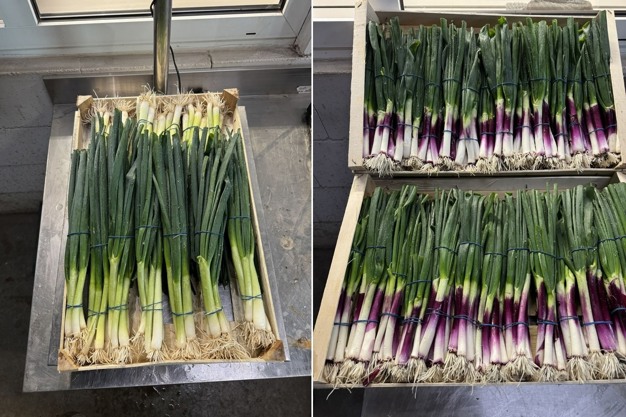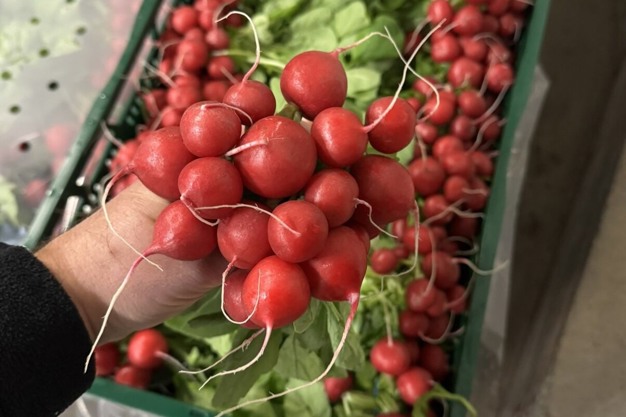 © FeSa Obst- & Gemüsehandels GmbH & Co. KG In week 12, the Palatinate spring onion harvest officially began. "There will supposedly be a small gap in the harvest when switching from the last winter spring onions, i.e., the overwintered 2024 seed, to the growing summer crop in June. We had to accept some damage due to frosts below -5 °C with the last sown spring onions of 2024, which were tiny going into the winter. Accordingly, the stocks have been severely thinned out, which is why we have to assume that yields will be reduced," reports Jochen Fehmel (r), managing director of the vegetable-growing company of the same name based in Mutterstadt. He goes on to say that the growing capacities for spring onions have remained almost the same as in the previous year.
© FeSa Obst- & Gemüsehandels GmbH & Co. KG In week 12, the Palatinate spring onion harvest officially began. "There will supposedly be a small gap in the harvest when switching from the last winter spring onions, i.e., the overwintered 2024 seed, to the growing summer crop in June. We had to accept some damage due to frosts below -5 °C with the last sown spring onions of 2024, which were tiny going into the winter. Accordingly, the stocks have been severely thinned out, which is why we have to assume that yields will be reduced," reports Jochen Fehmel (r), managing director of the vegetable-growing company of the same name based in Mutterstadt. He goes on to say that the growing capacities for spring onions have remained almost the same as in the previous year.
As in previous years, the German food retail sector partially and quickly switched to products of German origin. Meanwhile, prices are slightly above the level of the previous year. "This means that prices at least partially reflect the increased costs, even if the cost increase for production is not fully offset at present. The Egyptian product was reduced with the start of the German harvest and has largely ended." This year, the changeover from one season to the next has been quite fluid, says Fehmel, who, in addition to overseeing the vegetable growing business, also runs the FeSa trading company.
 © FeSa Obst- & Gemüsehandels GmbH & Co. KGIn addition to the white-green spring onion, which continues to be the consumer's focus, Fehmel also produces tricolor spring onions.
© FeSa Obst- & Gemüsehandels GmbH & Co. KGIn addition to the white-green spring onion, which continues to be the consumer's focus, Fehmel also produces tricolor spring onions.
'The framework is becoming narrower'
In the Palatinate region, the conditions for (outdoor) vegetable production are becoming increasingly difficult, Fehmel confirms. "It feels like the framework is getting a little tighter every year. In the area of crop protection, a perennial issue, existing and important products are losing their approval every year, and those that are still available are consistently becoming pricier. In most cases, alternative methods and measures are more cost-intensive; we only have to think of the additional expense for the mechanical use of machines in weed control. In addition to the increased consumption of fossil fuels, the initial investment and maintenance of this equipment are a major cost factor." In addition to the increased risk during the cultivation period, general cost increases for seed, fertilizers, and irrigation water should be mentioned, which have never gotten "cheaper" but instead are costing more each year.
In particular, the high degree of manual labor in growing spring onions should be mentioned. Fehmel: "Each little onion is pulled out of the soil by hand, cleaned and trimmed, and then dirt is removed in the washing lines. Staff are needed everywhere, but it is becoming increasingly difficult to find them. And if you do find these helping hands, the rapidly increasing minimum wage is creating incredible economic pressure. Wages are rising faster than sales revenue. At some point, we will have reached the limits that we set for our primary produce products. Then, whether a product is a success or not will depend on the weather, should the framework for agriculture not widen again."
 © FeSa Obst- & Gemüsehandels GmbH & Co. KGCrispy fresh radishes from Palatinate greenhouses.
© FeSa Obst- & Gemüsehandels GmbH & Co. KGCrispy fresh radishes from Palatinate greenhouses.
Harvest starts for greenhouse radishes
Not only outdoors, but also in the greenhouses of FeSa, harvesting is now underway. Since the end of calendar week 11, the radish harvest has been in full swing, while the strawberry harvest in protected cultivation is still lagging about 2-3 weeks behind. "We are experienced in radishes, but this is our first year harvesting strawberries. At the moment, things are looking good, and we expect a good strawberry yield from the first week of April. We start the radish season early in the greenhouse and then move smoothly into outdoor cultivation. We plan things a little differently for strawberries. We only harvest the red fruits that the plants offer us for about 6 weeks from the expensive greenhouse cultivation. Thereafter, a break is necessary before we can start again with a new set in the same area in September. This is a conscious decision: due to the high costs of the greenhouse, the low revenues of summer strawberries cannot be covered. That's why we exclude this seasonal period and rely instead on the fall harvest."
Despite numerous challenges, Fehmel is confident about the future. "We are constantly developing and rethinking all our operations every year. We question and rethink. For the future, we see ourselves in an unprecedented political and climatic situation. However, true to the motto 'If it were easy, everyone would do it, ' we feel highly motivated to take on this particular challenge," he concludes.
For more information:
Jochen Fehmel
P.+H. Fehmel Gemüsebau
Im Grund 1
67112 Mutterstadt
Phone: +49 (0) 6234 94767-26
e-mail: j.fehmel@fe-sa.de
Web: www.fe-sa.de
